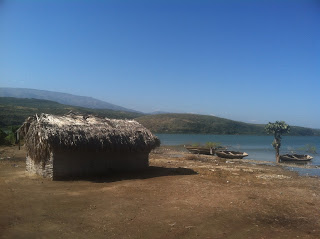Did my first extractions today! In a small hut in the countryside of Haiti, really felt incredible and I can't wait to do more. Ryan walked me through the procedure on the bus, and on a few patients before helping me out with my own. First we free the gingiva up around the tooth with a periosteal. Next, use the straight elevator to elevate the tooth from the buccal. Usually the mesio-buccal but distobuccal is also all right. Ryan advised against elevating from the lingual because you run the risk of injuring nerves and arteries. Elevation widens the alveolar bone around the tooth. Once the tooth begins moving we elevate as much as possible before using a forceps. For mandibular molars, the cowhorn forceps lock into the furcation and we rock the tooth facio-lingually while making figure-eight movements. Controlled slow pressure. Once the bone is widened enough the tooth generally comes out easily. After a couple more guided ones Ryan and I manned our own chairs in our small hut. We saw about 15 patients between the two of us, and had some really complex cases, considering there was no electricity. Ryan mentioned that in the US a bunch of these cases would easily be surgical. We worked through lunch and were the last group to finish up. We prescribed the patients amoxicillin, and ibuprofen after their extractions and sent them to the designated pharmacy to pick up the medications. After seeing tons of extractions from shadowing, I was surprised at the strength of the bone and teeth. There really is a good deal of force necessary to take out teeth. Dentists really know how to make it look easy.
(This was actually a church that was flooded after the earthquake, the small bit peeking from the water is all that's left)
(Our dental "clinic" was one of these huts)
This site is said to be the poorest, most devastated that we'll see, and the setting lived up to that. Upon arrival I was heartbroken by the sight of small huts covered with USAID tarps, hay rooftops, and children in tattered clothing. I immediately wondered what they ate out here, and it was clear that there wasn't much by the cries for food from the people as we disembarked.
We spent the day working with a few Haitian medical students. Ryan and I grabbed Mackenzie, who was one of the medical students who knew a good deal of English. During our dental presentation the previous day he also answered all of our questions, and had really great ones of his own. I explained to him how we gave anesthesia, and the nature of the tissues we were targeting. Incredible experience.
 We closed up shop much later than expected and hit the worst traffic I could imagine on the way back. We had run out of water bottles, and there was definitely no stopping for food after dark. The Haitian translator's parents were calling them since generally you do not want to be out later than you need to be in Haiti, especially during the holiday. I spent most of my time talking to the translators and learning some creole. I had a really great conversation with one of the translators about how Haiti is her one and only home. She has been to L.A. and Florida for vocal competitions, but has no interest in leaving unless it is for education. Every day I'm presented with more reasons to admire the Haitian people, and their sense of nationalism really struck a chord in me.
We closed up shop much later than expected and hit the worst traffic I could imagine on the way back. We had run out of water bottles, and there was definitely no stopping for food after dark. The Haitian translator's parents were calling them since generally you do not want to be out later than you need to be in Haiti, especially during the holiday. I spent most of my time talking to the translators and learning some creole. I had a really great conversation with one of the translators about how Haiti is her one and only home. She has been to L.A. and Florida for vocal competitions, but has no interest in leaving unless it is for education. Every day I'm presented with more reasons to admire the Haitian people, and their sense of nationalism really struck a chord in me.
Once we got back, we had a very late dinner, and a few of us got together to clean off the blood from our dental instruments and pack and run the autoclave. Plugged in my headlight to charge for tomorrow, another day living to serve.








No comments:
Post a Comment
Thoughts? Share!